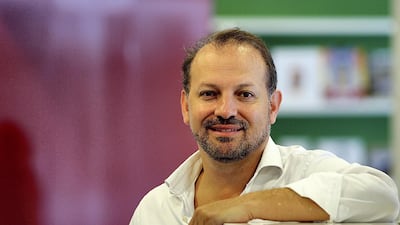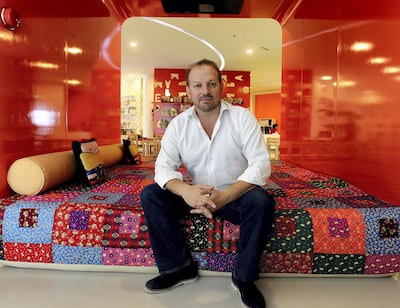For Mo Fadlallah, the founder of the parenting website Baby-arabia.com, building a business is similar to raising a child. The entrepreneur says he has adopted a nurturing approach towards the venture he launched in February 2016 to ensure his “family brand for the Arab region" survives in the long term.
“If you nurture a child properly and feed and support them, you know you will help that child grow and become successful and that is what we are trying to do with Baby Arabia,” says Mr Fadlallah, a Lebanese-Briton, who has lived in Dubai since 2005. “We are taking our time. Our focus is not on profit today but about building a sustainable model.”
The company started out as a content website focused on the development of a child until the age of six, providing information in Arabic and English to parents in the Middle East. However, Mr Fadlallah says it has since evolved and now also offers events, e-commerce, education and healthcare information.
"We are not just a website, we are a family brand," says Mr Fadlallah. "We are building an ecosystem, an environment that is fundamentally built around content that also caters to all the needs of parents and their young children."
_______
Read more:
Generation start-up: Mumzworld founder eyes faster delivery and growth
Now Money: a fintech start-up servicing the UAE's low-income migrant population
Generation Start-up: Pivoting business model pays off for Magnitt founder
_______
To finance this growth, Mr Fadlallah has secured funding from family and friends; to date he has eight shareholders, who are all hands-off and trust him to develop the company as he sees fit.
The first input was $100,000 from an uncle, which funded the start-up's set up. Next came “a few hundred thousand dollars more” from friends to cover the working capital.
“Good friends that I’ve known for 10 to 20 years, that have all become parents in the last four to five years, were interested,” says Mr Fadlallah, “At first I was reluctant to take money from friends because sometimes things can turn sour but I’d spoken to a wealthy Saudi businessman before that who wanted 51 per cent controlling interest and that immediately put me off. It’s really important that you know who you get into bed with as partners and investors.”
Mr Fadlallah says his shareholders understand his focus on building the business organically, rather than trying to scale up too fast.
“There is too much focus on the bottom line, on profitability, whereas I am focused on building brand equity. This is as important to me as revenue, especially in the early years of the business, because if I can build brand equity, who’s to say that in five or 10 years times that my company is not worth millions of dollars.”
This approach of “quietly growing” the business has paid off. The company is on track to break even in its third year of operations, having doubled its revenue year-on-year since launching.
“If we break even we will have done so purely on advertising and content marketing revenue, without going down the route of e-commerce and e-services, which will be part of our future revenue. Then we can go out and look for proper series A funding," says Mr Fadlallah, who hopes this will happen within the next nine months, stressing that he wants "a strategic investor rather than straight equity".
"We want somebody involved in the media space that understands the value of Baby Arabia. It’s not just about the equity but also about finding the right fit, somebody that can help us build greater market share and take the company to the next level.”
And it is the future Mr Fadlallah is very focused on. With 83 per cent of the website’s traffic coming from the GCC, primarily the UAE and Saudi Arabia, and the majority of its social media audience coming from Egypt, the company is looking to diversify what it offers.
To do this, it launched a parenting conference in Dubai on Saturday, that will be rolled out across the region next year. It is also launching its e-commerce arm next month that will see it act as a marketplace for brands across the region and Baby Arabia launched an app earlier this month that offers parents access to all of its services.
Mr Fadlallah enjoyed a 25-year career in media production before he came up with the concept for Baby Arabia.
The change in focus came seven years ago when he suffered a series of personal tragedies; his father died in 2011, followed by his uncle in 2012 and his younger brother two months after that.
“I’d been living with my brother for six years when he died of a heart attack,” he says. “It was a tough 18 months and it really made me reflect on where I was in life. I became very disillusioned with the TV and film world in the region and I did not feel I was fulfilling my capabilities or my dreams and goals.
“I am a social entrepreneur, I am a humanitarian – in the last few years I have organised five children’s charity events between Lebanon and the UAE – so for me it’s about building a business that’s meaningful and purposeful, it’s not just money orientated.”
One of the big drivers for setting up the website was a need for more Arabic content focused towards parents.
“Today they say less than 3 per cent of content on Google is in the Arabic language so everybody is crying out for Arabic content, so I saw this as an opportunity for creating a platform that can really engage with the community," he says. “Everybody references parenting.com, parents.com, babycentre.com and Mumsnet but where is the Arab version of all of those? That is what I am trying to do.”
______
Read more:
Generation Start-up: Funding was 'petrifying' in the early days, says Fetchr founder
Magnitt, the start-up for Mena start-ups, secures $1m in funding
Souqalmal.com raises $10m in Series B funding with investment from UK's GoCompare
______
So what is next for Baby Arabia?
While the focus is on the Mena region for now, Mr Fadlallah says his ultimate aim is to expand the brand globally, something he plans to do through partnerships.
A new focus regionally is its baby-box concept in Saudi; a box filled with goodies for new mums will be sent out to 10,000 mothers, a concept he says took a year to get approval from the country's Ministry of Health.
Globally, the company now has ties with a London-based global healthcare brand to promote its services to Baby Arabia members.
“So if you want to go to London for a particular treatment you will be able to book through Baby Arabia," says Mr Fadlallah. "We are constantly evolving because there is so much to do. The more value-added service and convenience we provide, the more we can build brand equity."
Long term, the company even hopes to have offline stores to sell leading brands in the region.
It’s a huge project for a man with a team of just 10. It is a also an unusual business choice for a man with no children of his own.
"People look at me with amusement and say 'I don’t get it. You are not married, you have no kids, so what made you think of this?'
"Obviously, I recognised there was an opportunity, as no one was focused on delivering a platform to really support the needs of Arab mothers. But I also just have an affinity towards children’s causes or needs and there’s nothing more satisfying knowing that you are contributing towards the betterment of women and children in this region."
So does he hope to have children of his own in the future?
“That’s a work in progress,” he laughs.
“I’m raising Baby Arabia right now so that's more than enough of a handful for now.”
Q&A
Mo Fadallah talks to The National about his start-up Baby Arabia and his business outlook.
What is the secret to a start-up's survival?
It is about carefully managing resources because a lot of people spend their money quickly without looking ahead. Because of my experience, I was able to gauge market conditions last year and this year and say 'OK, advertising is not doing great.' So rather than keep spending, spending, spending, it's about carefully managing your resources. If you can survive the first three to four years of a business you will increase your chances significantly in order to grow and scale.
What have you learnt since starting your business?
Although I’ve aways been an entrepreneur and had other smaller businesses I’ve started up in the UK, such as a small production company, it’s always been my money invested. This is the first time I’ve taken on the responsibility of other people’s money. After living through the online boom and bust of the late 1990s and seeing how some businesses succeeded and others failed, it proved to me that it’s not about how much you raise (because some raised millions of dollars, created a lot of hype and then disappeared) it’s about allowing a business to breathe and to naturally grow and evolve, especially if you can see the long-term vision. Therefore, I've learnt that nothing comes easy in life - the hard way is the right way.
What would you change if you had your time again?
Because I’ve taken my time I don’t think I would change anything. Sometimes having too much money is an evil because it puts pressure on the business to spend that money in order to deliver results. For us it’s not about how fast we can build it, because then it’s a case of then what, and if you build it too quickly, the house will fall down.
How involved are your shareholders?
They are not hands-on because there is a trust issue there. I inform them on a quarterly basis of what we are doing. All of them bought into the vision from day one whereas other investors and VCs completely missed the vision of what I was trying to build.
Why was that?
They’d say 'no, there are other websites out there.' They did not see I was building a brand, an ecosystem, an environment for parents to come to and it can touch all these key points in terms of retail, education and more - they could not see that.
Did you time the launch of your business right?
Our timing was spot on but anyone trying to get into the e-commerce space now is pushing it.



